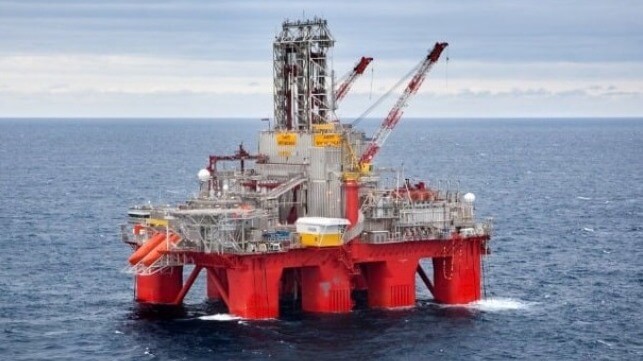Mediation Reaches Deal Preventing Norwegian Oil Workers' Strike

Last minute efforts were underway led by Norwegian government mediators today to stave off a strike due to start at midnight impacting a dozen rigs and drilling vessels as well as some union members working on offshore platforms. Late today the three unions announced an agreement heading off the strike which was coming at the same time as the Norwegian government announced a major expansion of the industry.
Representatives of three Norwegian unions were summoned to negotiations today in Oslo with the mediators hoping to break an impasse over wages. The negotiations broke down on May 24 and on June 12 Industri Energi filed notice of its intent to strike. The union, which represents more than 4,000 oil sector workers, says the strike would involve 913 members working for subcontractors at 12 facilities and 16 companies. Among the major employers listed by the union to be included in the job action are Seadrill, Noble, Odfjell, and Saipen as well as Sodexo, a catering supplier at many of the sites.
“The rigging industry is doing well and we must have a wage settlement that ensures that this industry is competitive in the battle for labor. But the distance between the parties is too great for us to reach a settlement now,” said Frode Alfheim, confederation leader of Industri Energi, when the talks broke down.
Earlier this week, another union, Safe, filed notice under Norwegian’s labor laws to join the planned strike. The union, which also has members on drilling rigs and other installations, said 637 of its members would join the strike scheduled to start at midnight on June 29. A third smaller union, DFSO, had also given notice saying that 94 of its members would be joining the strike. In total, 1,644 members from the three unions are now scheduled to walk off their jobs tonight.
Under Norway’s labor laws, the unions are required to give at least four days’ notice before any form of job action. The three unions represent approximately 7,500 drilling and industry workers with Industri Energi warning that there is a potential for the strike to expand to other members if a settlement is not reached. Production workers, however, reached a tentative wage agreement last month with companies including Equinor and Conoco Philips.
Terms of the agreement calls for a minimum of five to six percent wage increases for all workers effective as of June 1. In addition, they will receive an increase in the supplement for nighttime work as well as holiday pay.
Norway is one of Europe’s largest oil and natural gas suppliers and the only net exporter of oil and gas in Europe. This strike would have initially disrupted exploration and stat-up activities at new fields and potentially could have impacted expansion projects if the strike had persisted.
While the negotiations were ongoing, the Norwegian government today also announced that it was approving 19 new oil and gas projects on the Norwegian continental shelf. The total investment was estimated at nearly $19 billion with the projects consisting of new developments, further development of existing fields, and investments to increase extraction at existing fields. Between 2020 and 2022, Norway changed tax regimes to encourage near-term investments in oil and gas.
"The implementation of these projects secures jobs, builds competence, and provides a basis for further technology development which will be decisive for the development in other industries such as carbon capture and storage, hydrogen, offshore wind, aquaculture, and minerals," said Norway’s Oil and Energy Minister Terje Aasland.
Norway is seeking to blunt criticism over the expansion of the fossil fuel industry by citing the importance to provide stability and ensure supply to Europe. They are saying these supplies would be online by the late 2020s meeting immediate needs while alternative fuels and transitions are developed.
No comments:
Post a Comment